Immigration
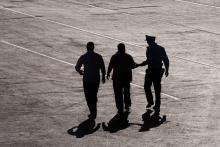
When you turn on the faucet in Flint, Mich. you don’t just get water — you also get the potent neurotoxin lead. And without a driver’s license, Flint residents are being refused bottled water from the city, so undocumented people have to search elsewhere for clean water, reports America magazine. Deacon Omar Odette of Our Lady of Guadalupe Parish in Flint says that members of his parish have been arrested by immigration authorities for not having documentation.

How well would you do representing yourself in court? Unless you’re a lawyer, probably not very well, but according to Jack H. Weil, young children can learn enough immigration law so as not to require a lawyer in immigration court.

FOR CHRISTIANS who live near the U.S.-Mexico border, Jesus’ command to “love our neighbors as ourselves” takes on a particular urgency when we see our neighbors fleeing violence from their home countries and then being deported back at an alarming rate.
At Southside Presbyterian Church in Tucson, where I am pastor, we have a history of loving our neighbors by offering them protective sanctuary to shield them from deportation.
Sanctuary is an ancient biblical tradition. In Exodus, Numbers, Deuteronomy, Joshua, and 1 Kings, scriptures describe the right of asylum in cities of refuge set aside for those accused of manslaughter until the truth of the matter could be resolved. There is also the tradition of those who seek the safety of the temple by clinging to the “horns of the altar” (1 Kings 1:50).
In the U.S., churches involved in the abolitionist movement and the Underground Railroad provided sanctuary to escaping slaves. In the Vietnam War era, churches protected conscientious objectors. During the brutal wars in Central America in the 1980s, hundreds of U.S. churches declared a national sanctuary movement, protecting tens of thousands of refugees from being deported to almost certain death. Southside Presbyterian was one of the founding churches of the 1980s sanctuary movement.
In May 2014, after another wave of deportations, our congregation made a public declaration to once again become a sanctuary church. We welcomed Daniel Ruiz, a local undocumented father, into protection. After 28 days living in the church, he received a stay of deportation.

There’s a name for xenophobic-motivated politics: nativism. Oxford Dictionaries defines nativism as: 1)The policy of protecting the interests of native-born or established inhabitants against those of immigrants, and 2) A return to or emphasis on traditional or local customs, in opposition to outside influences.
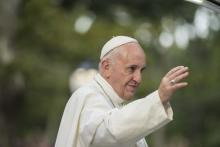
You probably saw the media frenzy around Pope Francis’s comments aboard the papal plane on his trip back to Rome from Mexico last week. When asked about presidential candidate Donald Trump’s plan to build a wall along the U.S.- Mexico border, the pope said, “A person who thinks only about building walls, wherever they may be, and not building bridges, is not Christian.”
However, I was struck most by the pope’s following remarks, which were omitted from several mainstream media accounts — when he said of Trump’s plans, “This is not in the Gospel.”

Francis is right. The spirit of religion is about healing and nurturing and bringing together. And he puts the question into the politically charged air once again: Walls or bridges? What’s it going to be?
Do we open ourselves to the spirit that wants to give us new hearts? Or do we choose to have hearts as cold as a stone wall?

As "America's foremost Catholic," Stephen Colbert feels uniquely positioned to "broker a peace" between the two. He laid out his rationale on his late show.
“Mr. Trump, Mr. Pope (I believe that’s his formal name) is it possible that you’re fighting because you have so much in common?" said Colbert.

The legislative consequences of Pope Francis’ visit are still to be seen, though Speaker of the House Paul Ryan has vowed to block immigration reform until 2017. Nevertheless, for Andrea Cristina Mercado, who describes her relationship with Catholicism as “fraught,” the Francis Effect is already real.
“He is a really holy, spiritual leader,” she said. “[Pope Francis] drew me back into the church.”
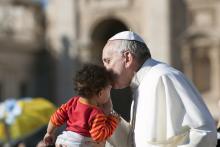
Pope Francis conducted Mass in the Mexican state of Chiapas (home to more than 1 million indigenous people), with Bibles available in different indigenous languages in order to make the ceremony accessible to as many audience members as possible.
Pope Francis minced no words when it came to the environment: “The environmental challenge that we are experiencing and its human causes affects us all and demands our response ... we can no longer remain silent before one of the greatest environmental crises in world history.”

1. In the midst of a historically horrible refugee crisis, why didn’t you actively pursue helping the poor, the destitute, and those in desperate need?
Are followers of Jesus supposed to forsake compassion, sacrifice hospitality, and abandon love in favor of a political policy, national security, financial stability, and personal comfort? God is perfectly clear what the mandate is for helping those in need, and yet Christians continue to remain apathetic, passive, and even aggressively hostile toward the notion of aiding such victims.

Do you remember the video clips of 5-year-old Sophie Cruz dashing across Constitution Avenue to Pope Francis’s popemobile during his visit to Washington, D.C., last September? The story of that encounter went viral: a young child with undocumented parents from Mexico who was granted permission to approach the pope, give him a letter, and receive a hug.
At the time, many seemed surprised by encounters like these during the pope’s U.S. trip — particularly that he would choose to make personal contact with the realities faced by marginalized populations. But this encounter-centered approach has been Francis’ way of operating since the outset of his pontificate.
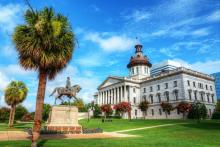
Evangelical advocates for immigration reform are concerned that proposed South Carolina legislation will make it more difficult for faith groups to help refugees in the Palmetto State. The bill, which passed a state Senate committee in late January, could make organizations that sponsor refugees liable if the new residents should later commit a terroristic act or other crime.

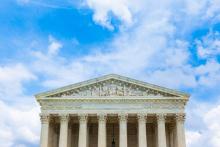
The Supreme Court’s decision to take up the case now is highly significant, since it means that the court will rule on the matter during this term (likely by the end of June), allowing President Obama and his administration to at least begin moving forward with implementation before he leaves office.
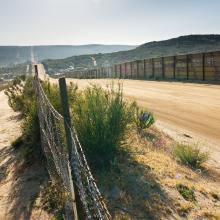
Due to a sudden wave of ICE raids and deportations of asylum seekers fleeing violence in Central America, the White House has faced anger from numerous Democrats in Congress, who drafted a letter denouncing the raids. This new refugee plan, which sets up screening facilities in Central America, aims to reduce human smuggling as well to slow the flow of undocumented immigration.

January 1 marked the 124th anniversary of the opening of Ellis Island. Years later, in 1916, the immigrant inspection station was opened. Over the course of 60 years, more than 12 million immigrants came through the island.
Almost all of my great-grandparents were among that number, although, according to a sister who has been researching our history on ancestry.com, we can’t find any records. A fire destroyed the original station in 1897. It’s likely that our family’s records went up in flames with so many others’. Although — like many New Yorkers — I’ve never been there (who really has the time to schlep over there except tourists or class trips?), the island looms large in our collective self-understanding. Yes, we are Americans, but for us “American” meant “immigrant.”
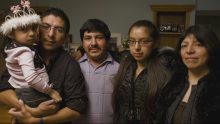
On the day Sam and Elida we to be deported, I arrived at the airport, with the entire Mejia family, and was witness to one of the most intensely sad events I’ve ever seen: a mother and father saying goodbye to their children, not knowing when they would see them again. As I drove home from the airport that night, I thought to myself, if every politician, faith-leader, and citizen in the U.S. could have met the Mejia family, and then seen the family ripped apart, the U.S. would not be deporting hundreds of thousands of immigrants every year. The raids that are descending on immigrant communities right now, targeting Central American families who recently crossed the border escaping extreme violence, would most likely not be happening. The de-humanizing term ‘illegal alien’ would not proliferate across our airwaves.

IN NOVEMBER, the Fifth Circuit Court of Appeals blocked a series of Obama administration executive orders intended to shield millions of immigrants from deportation.
Of course, there’s a backstory: After the 2014 failure of Congress to pass comprehensive immigration reform, President Obama attempted to create one program, called Deferred Action for Parents of Americans and Lawful Permanent Residents (DAPA), and expand an existing one, called Deferred Action for Childhood Arrivals (DACA).
As its name suggests, DACA was created to protect children—more than 1.7 million, according to the Migration Policy Institute—who were brought to the United States before they turned 16. These “Dreamers” have become a visible and powerful political movement. DAPA is intended to provide work permits and exemption from deportation to those adults with children who are U.S. citizens or lawful permanent residents.
In the dangerous environment created by our failed immigration policy, these two protections are essential for keeping families safe and together.
But when the Obama administration announced these programs in November 2014, some states claimed that expanding the number of immigrants allowed to stay in the U.S. would cause an unfair increase in the cost of state services. Ultimately, 26 states sued to stop the DAPA/DACA changes. In November 2015, the Fifth Circuit—which covers Louisiana, Mississippi, and Texas—found in favor of the states. The Justice Department then appealed the decision to the U.S. Supreme Court, which is likely to decide the case before a new president takes office.
Immigrant and family advocates, along with religious leaders, criticized the ruling. “After the Fifth Circuit’s decision concerning DACA and DAPA, what remains abundantly clear is that the U.S. Congress needs to urgently address immigration reform,” said Gabriel Salguero, president of the National Latino Evangelical Coalition. “Hispanic Evangelicals are looking for genuine leadership on this issue. No more delays and excuses.”
Nineteen faith-based organizations (including Sojourners) filed an amicus brief with the Fifth Circuit Court to advocate alongside individuals seeking relief from deportation, and churches across the country had begun to prepare members to apply for DAPA and the expanded DACA.

As Donald Trump continues to dominate media that try to balance a fascination for celebrities with a duty to check facts claimed by public figures of all stripes, some critics of the GOP presidential frontrunner may recall 18th century novelist Oliver Goldsmith’s line, “The loud voice that spoke the empty mind.” But a more apt thought may come from the classic 1983 movie “A Christmas Story” (airing on Turner cable networks dozens of times this week).
Remember Ralphie noticing the neighborhood bully?